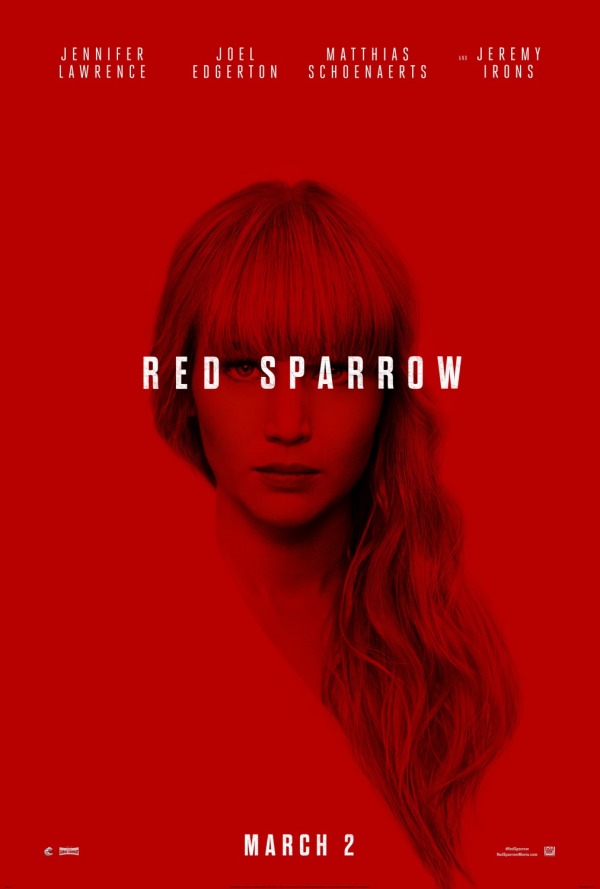RED SPARROW (Dir. by Francis Lawrence, 139 minutes, USA, 2018)
BY EVAN HUNDELT Director Francis Lawrence’s seventh feature film Red Sparrow, starring his actorial muse Jennifer Lawrence, may, to the exacting cinephile, suffer from unbidden comparisons to his work with her on the culturally ubiquitous The Hunger Games quadrilogy. Whether or not Francis Lawrence consciously designed Dominika Egorova (the conscripted Russian special operative known as a “Sparrow,” stunningly portrayed by J.L.) with this nagging prospect in mind, what is certain, as emphasized bewilderingly in the film’s opening scenes (in which a cane-turned-warhammer figures prominently), is that Jennifer Lawrence has undoubtedly graduated from the diffident carnality, cotton-candy soft brutality, and kitty-pool warmness that gags the PG-13-delimited Katniss Everdeen.
Dominika lives with her mother, Nina Egorova (Joely Richardson), who suffers from Parkinson’s, in a comfortably capacious apartment near St. Petersburg, funded wholly by governmental patrons of a prestigious Russian ballet company, of which she is the unanimously-adored prima ballerina. During a performance which spans the film’s opening scene, Dominika, with delicate strength, floats across the stage to a veritable rendition of orchestral thunder. An awe-induced stupor pervades the audience, and during the nearing moments of perfect limerence, a booming snap of Egorova’s leg, as she is tossed by her male counterpart, causes the lulled consciousness to refocus with a force that shatters composure into fragmentary horror and incredulousness. The camera assumes a sparrow’s-eye-view of the shimmering proscenium, and looms menacingly over the prima ballerina and her grotesquely contorted leg, as if she were soon-to-be carrion.
Egorova’s dancing career is prematurely over. Her ominously deadpan uncle, Vanya Egorov (Matthias Schoenaerts), who is the Deputy Director of the S.V.R., the external intelligence agency of the Russian government, visits the convalescing Domenika at her apartment on the pretext of consolation, but instead offers her a way to stave off her impending eviction, the result of her now-nullified ballet company sponsorship. Dominika is coerced by her uncle into seducing a person of interest to the S.V.R. — someone she met just before her career-ending performance.
But things don’t go as she had intended, and her unwilling involvement in a crime forces her to either choose between summary execution or cooperation with the S.V.R. —i.e., undergo training as a Sparrow. The Sparrow School is eerily reminiscent of the way Harvey Weinstein used Miramax as a magnet for gorgeous women whom he can objectify and sexually abuse as he pleases with full indemnity. The morally reluctant Dominika is reduced to carnal fodder as she undergoes training as a Sparrow, and is peremptorily guided, through each increasingly degrading and preposterous phase, by her ruthlessly brusque and unsympathetic precept, who, during a scene in which Egorova is asked to strip naked in front of the class, tells the unwilling studentesse: “You have been selected for your Beauty. You must release the sentimental morality with which you are raised—or was it pride?” But Dominika remains steadfast, as she remembers what her prescient mother told her: “Don’t give them all of you, that is how you will survive.”
Needless to say, Egorova’s un-serendipitous trajectory only worsens, as she grimly realizes the ineluctability of her immoral situation, which she phlegmatically accepts as her only means of survival. Her unwavering disgust for her uncle, the Russian government, and her ignominious new occupation, is artfully expressed in the inexpressiveness she exudes with increasingly crestfallen inertia, like a prostitute who no longer experiences the pangs of her tawdry labor.
And it is this dissipation of ethical self-possession, a seemingly indelible release of the remaining sentience of the soul, which is required–as sort of insidious ingredient–of Dominika, to complete the mission “awarded” to her upon graduation from The Sparrow School. An American C.I.A. operative embedded deep within Russia, caught, presumably, exchanging conversation with a suspected SVR mole, is her target–the name of said turncoat, the object of her assignment.
But the true genius of Egorova–the horrifically prodigious extent of her ability to inveigle, with diminutive subtly, men and woman beyond the fourth wall–is the undertow which lurks beneath the superficial torrent that is her assignment. Her allegiances, motives, and veritable eros for certain figures, grows increasingly shifty–and we, the audience, can’t help but feel we are, like the carnal men under her Amazonian rule, helplessly pulled along by her manipulative illusions.
Although this film portrays the fantastical, de-humanizing methodology of Russian espionage, its relevance to current events could not hit closer to home, unfortunately. Red Sparrow is, in one sense, an allegory of the despotic, patriarchal rule of powerful men like Weinstein, and one cannot help but empathize, to an uncomfortably vivid degree, with Dominika Egorova’s simple desire to provide for her family, by maneuvering through the loopholes and implacably narrow constraints installed by men of power.
The most compelling and important movies are those that empathetically supplant the audience, with the characters of their films: there is no more effective tool to educate, convince, or shift one’s moral equilibrium. Leo Tolsoy, in his essay series “What is Art,” defines its highest form as such: “A means of unity among men, joining them together in the same feelings, and indispensable for the life and progress towards well-being of individuals and humanity.” This movie is indispensable for the grossness of its intimacy with lecherous men, and uniquely forcible in its ability to portray the transmogrification of a patriarchally inflicted woman into the very thing which terrifies her, an inexorable machismo which plagues, to varying degrees, the men by whom she was “inspired.”

